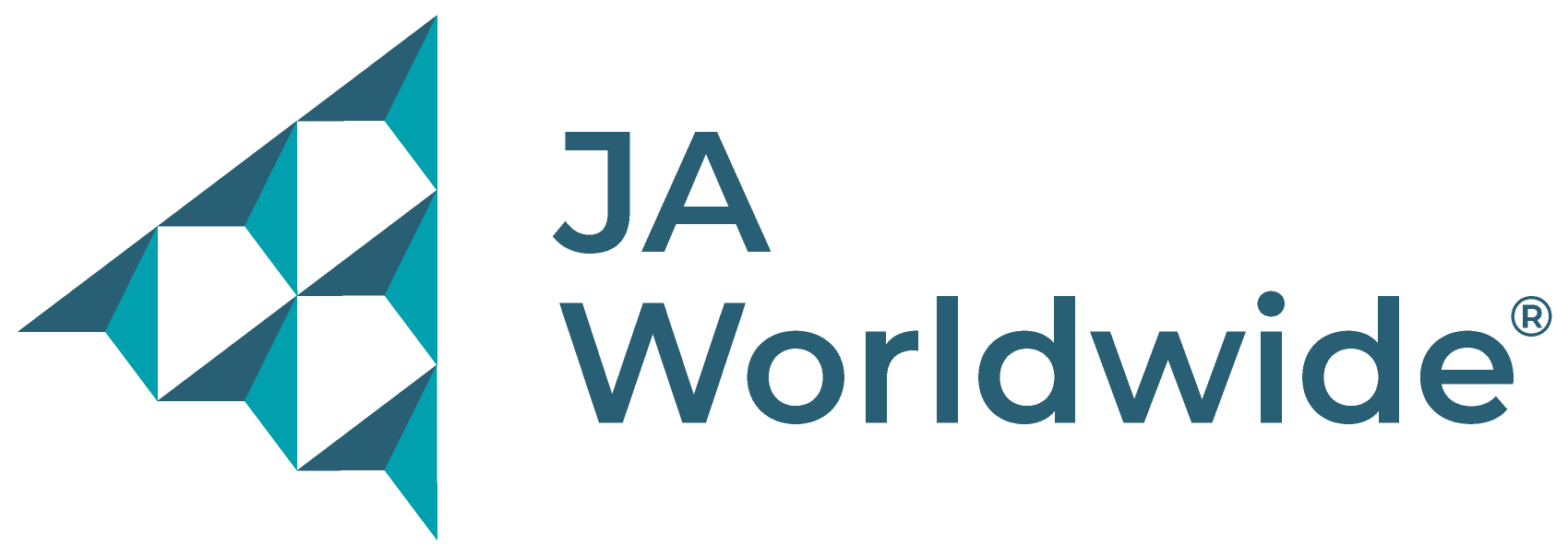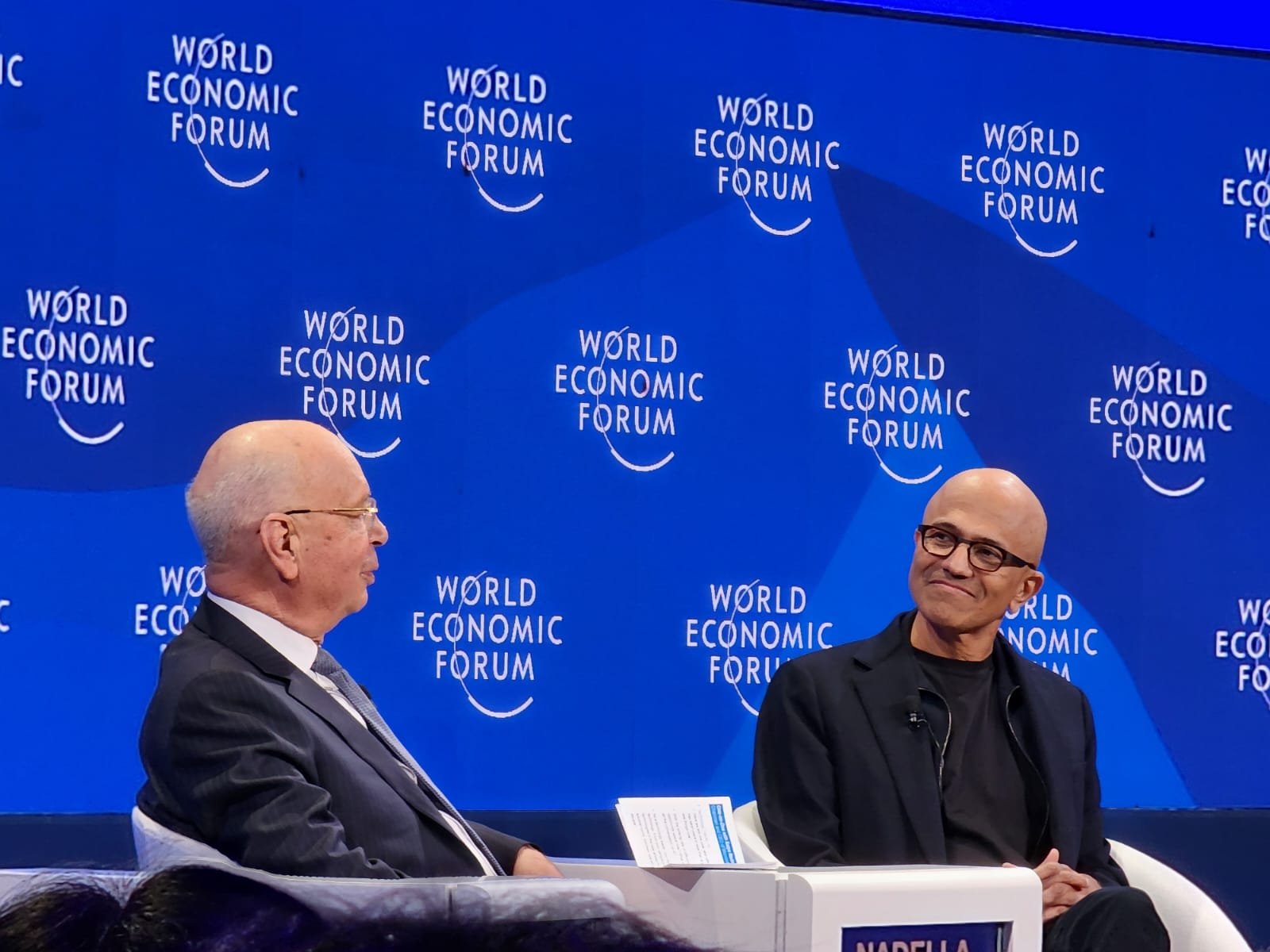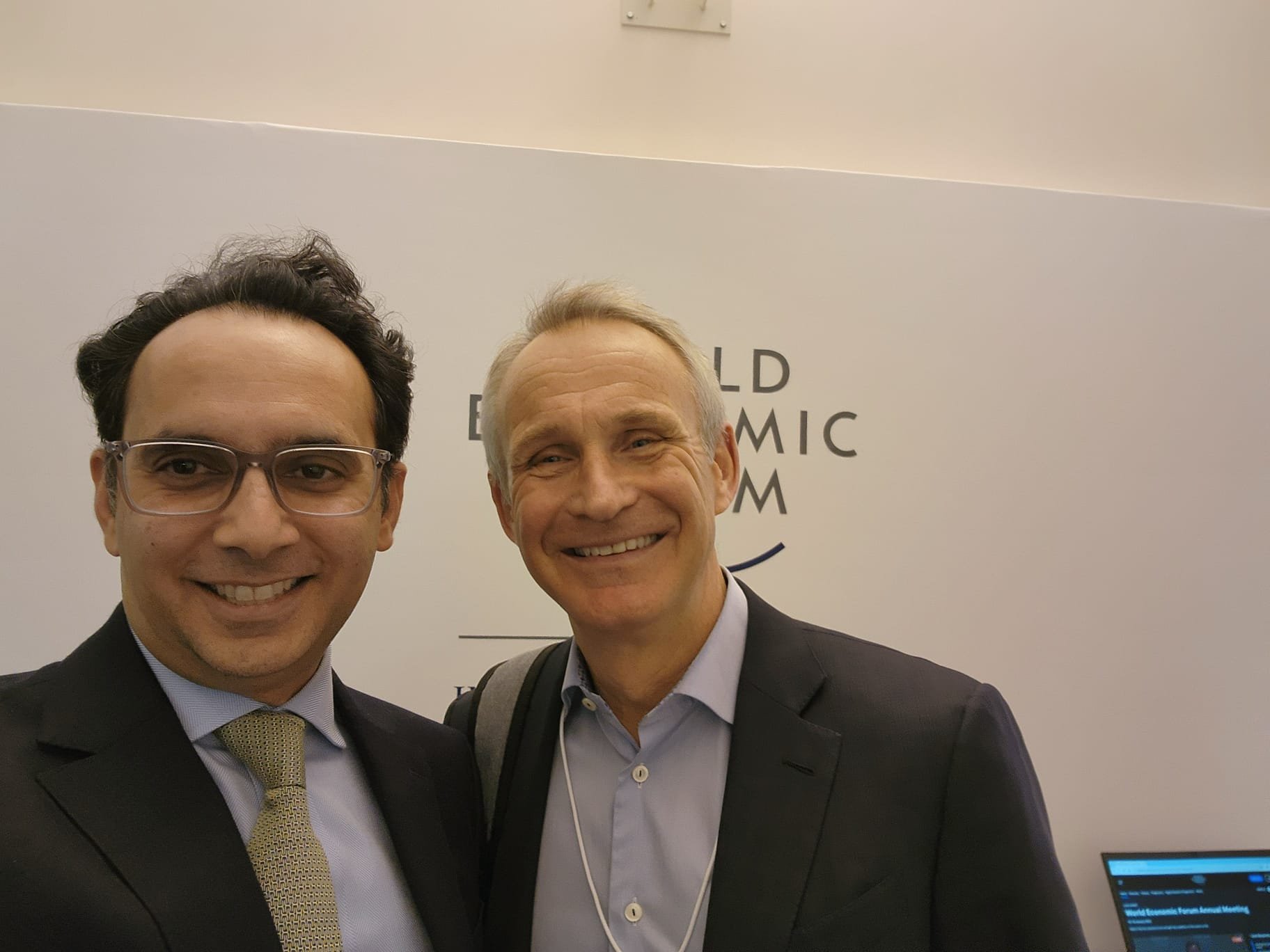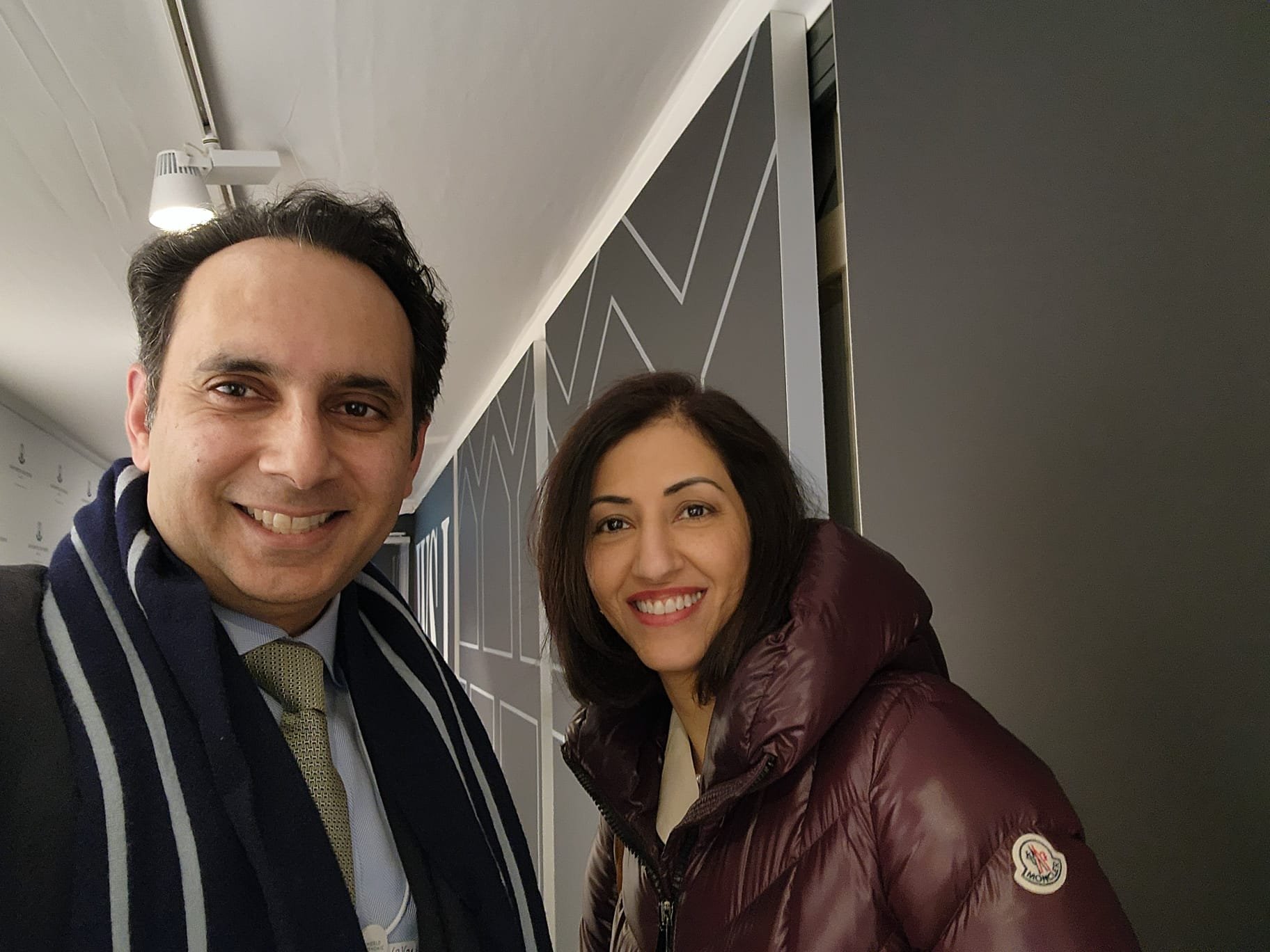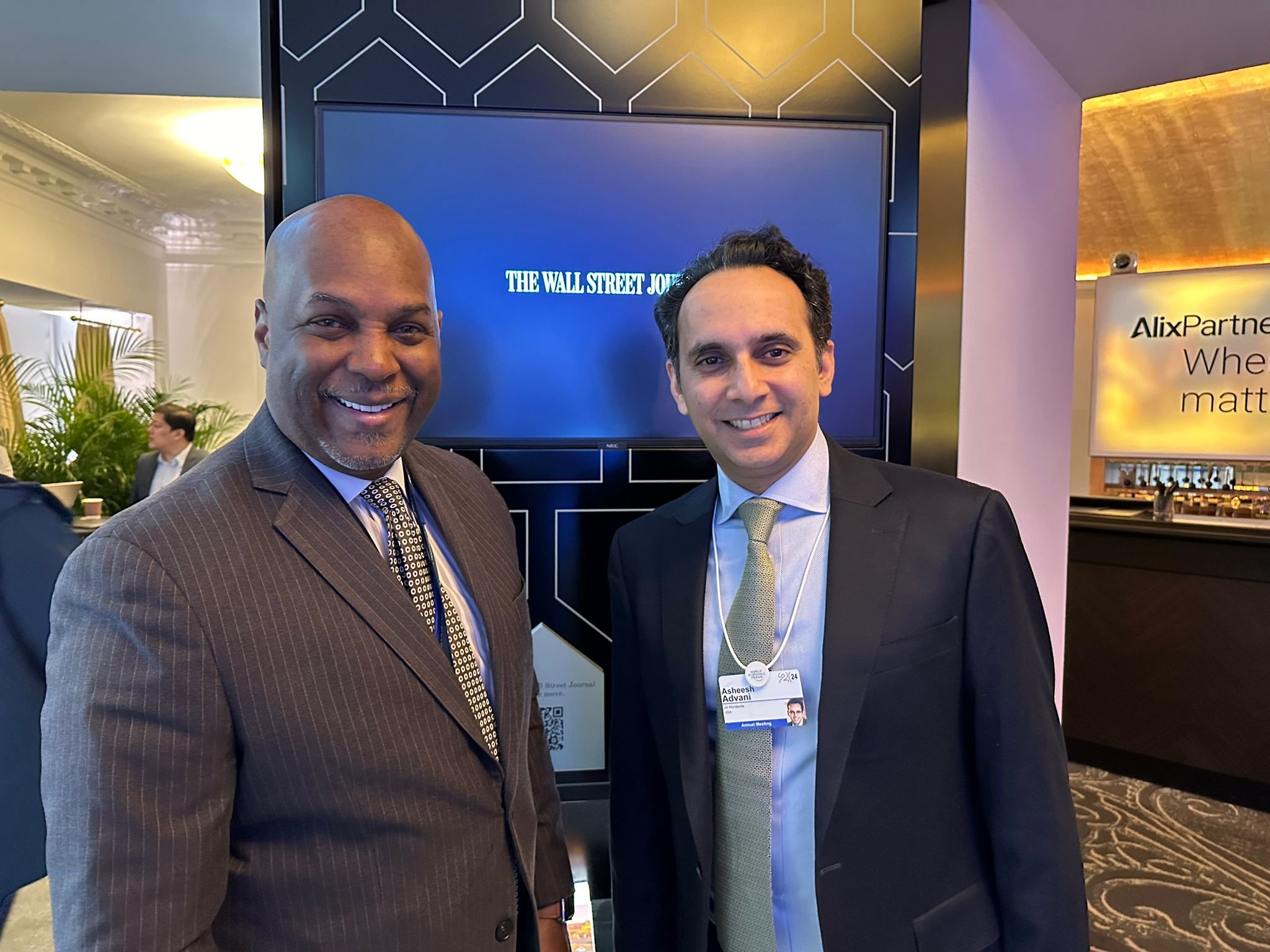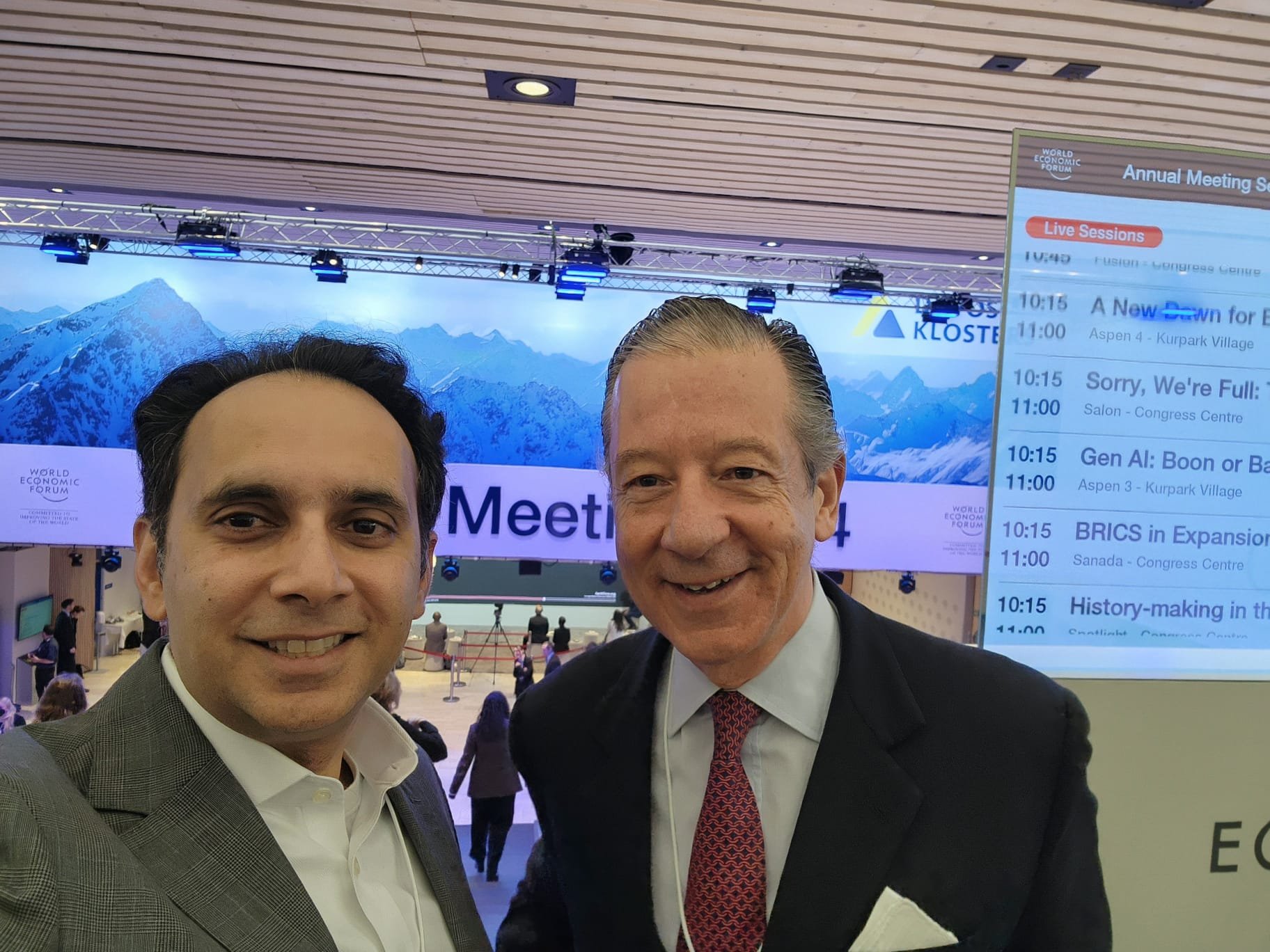Notes from Davos 2024: The World Economic Forum Annual Meeting
Guest post by Asheesh Advani, CEO, JA Worldwide
Tuesday, January 16, 2023
JA in Davos: The 2024 World Economic Forum Annual Meeting Kicks Off
As you may remember from previous years, I head to Davos, Switzerland, every January for the Annual Meeting of the World Economic Forum (WEF), joining leaders from business, government, and other nonprofits. This year’s focus for the Annual Meeting is “Rebuilding Trust.”
Who attends Davos?
The WEF event will welcome over 1,000 WEF partners, 100+ government leaders, nearly all major international organizations, civil society leaders, social entrepreneurs, youth representatives, content experts, and media. Corporate leaders connected to JA who plan to attend include JA Worldwide Board Chair, Jonas Prising (Chairman and CEO of ManpowerGroup) and former JA Worldwide Board Chair, Francesco Vanni d'Archirafi (Chair of Euroclear Holding). As in previous years, I expect to see many more board members from all parts of the JA network during the week. Also, JA Europe CEO, Salvatore Nigro, will be in Davos this year.
The WEF gathering is more global than most conferences, featuring representatives from countries as diverse as China and Colombia: Read more about who is attending.
Why does JA spend time attending this meeting?
JA stands at the intersection of business, government, and education, and Davos is one of the few places where the three come together. Through government partnerships, JA’s curriculum is offered in public schools in over 100 countries. And through our relationships with companies (including over 70% of the Fortune 200), we receive funding and mentors to develop curriculum, support teachers, and train volunteers. With so many government/education representatives and business leaders in attendance, Davos offers opportunities for JA to strengthen the ties we have, build new relationships, and find pathways for even more youth to develop the skillset and mindset to build thriving communities.
The annual meeting agenda focuses on the issues that are most urgently affecting the world. This year’s theme—Rebuilding Trust—centers on four subtopics: (1) achieving security and cooperation in a fractured world; (2) creating growth and jobs for a new era; (3) artificial intelligence as a driving force for the economy and society; and (4) a long-term strategy for climate, nature, and energy. As you can imagine, most of JA’s focus is on the second (creating growth and jobs for a new era, which covers both education and lifelong reskilling), but I’m spending time on AI and sustainability initiatives, too.
JA is also involved deeply in two WEF initiatives that have a strong presence in Davos:
Reskilling Revolution: Launched just as the pandemic was spreading around the world in January 2020, the Reskilling Revolution aims to empower one billion people with better education, skills, and economic opportunity by 2030. The Reskilling Revolution is hosted by the Centre for New Economy and Society at the World Economic Forum, for which I serve on the Advisory Board. As our work is so closely aligned to preparing youth for the future of work, JA aims to deliver over 100 million student learning experiences during the Reskilling Revolution’s ten-year term (2020-2030). Given our recent growth from delivering approximately 10 million student learning experiences per year to just over 15 million per year in both 2022 and 2023, we are on track to exceed our original goals for the decade. Credit for this goes to the JA network of teams, our staff, our board members, and our partners.
Education 4.0: Last year, WEF introduced the Education 4.0 Framework, which was developed by educators and employers to better prepare the next generation for the future of work and societies. WEF also released its first Education 4.0 Lighthouses at the 2023 Annual Meeting, featuring examples of public-private collaborations that are leading the way toward Education 4.0. JA’s Entrepreneurial Skills Pass was among the 16 featured lighthouses. This year, WEF will release more lighthouses, along with emerging practices that have been piloted and show great promise if they can be scaled. We’ve been fortunate to be a member of the Education 4.0 Alliance along with other nonprofits and businesses, who serve as champions for transforming education globally.
On Wednesday, I’m serving on a WEF panel in the Congress Center at the Annual Meeting—“The Race to Reskill”—along with Saadia Zahidi, Managing Director, World Economic Forum; Jeff Maggioncalda, CEO, Coursera; Doris Anite, Nigeria’s Minister of Industry, Trade and Investment; Denis Machuel, CEO, Adecco Group; and Claudia Azevedo, CEO, SONAE SGPS. Given that one-quarter of all jobs are expected to change in the next five years, we’ll discuss business and policy approaches to facilitate the urgent need for reskilling, upskilling, and job transitions.
Although the panels, interviews, and speakers at the WEF Annual Meeting are the main attraction, the additional events in Davos are equally interesting. For example, I’m meeting with young sociopreneurs who are doing important work that we would like to amplify. I’ll also be sitting for interviews, filming portions of conversations, and attending side events that relate closely to JA’s mission.
One additional benefit of attending the Annual Meeting is the opportunity to submit our opinions and insights to Agenda, the WEF blog. I’m currently working on a piece on mental health that I’ll co-author with a JA alumna and the head of an important JA partner, which I’ll share with you when it’s published. Last year, I focused on the three critical skills students need for the future of work. In previous years, I explored ideas about building optimism in youth, preparing youth for a post-COVID job market, speeding up the process for updating school curriculum (which was voted among the “Best of Davos”), and surviving in a fractured world. In addition, I’ve had the opportunity to partner with Grégory Renand, head of Z Zurich Foundation, to discuss youth entrepreneurship in Africa, with EY to share the findings of our study on Gen Z, and with Leo Martellotto, when he was President of JA Americas (he’s now the JA Worldwide Chief Development Officer), to explore how to reduce youth poverty.
Because of its importance in global discussions, the WEF Annual Meeting also triggers the release of important reports, both of which are hot off the presses and worth the read:
I just arrived in Davos this morning, and I’m excited both to represent JA on the global stage and elevate the voices of young people who are attending the event. In addition to daily updates that I’ll post, you can watch a limited livestream of the events at weforum.org and wef.ch/youtube and follow the #WEF24 hashtag on social media.
Wednesday, January 17, 2024
JA in Davos: Day 2
I got into Davos yesterday morning and have been immersed in learning, listening, and meeting interesting people.
Keynote talks that I attended included a chat with the fiery—but also hopeful—President Volodymyr Zelenskyy, discussing Ukraine’s urgent need for business investment while touting an astonishing 5 percent growth in Ukraine’s economy in 2023, despite nearly two years of war. The Ukrainian president also announced that he is working with Switzerland on a peace summit and received a standing ovation from the packed audience.
Other WEF sessions on Tuesday focused on refugees, geopolitics, gender parity, sustainability, and financial inclusion, and they all shared a common theme: The road ahead won’t be easy but will lead to far greater equity, inclusion, and peace. As an optimist at heart, it gave me great hope to hear so many speakers sound both enthusiastic about the future and girded for a tough road ahead.
The rest of Tuesday’s panels and conversations centered on AI and its role in creativity, education, and disinformation; AI’s potential to both widen the equity gap and close it; and the need to both expand AI and to regulate it. Here, too, I was surprised by how optimistic most of the AI panelists were, especially around generative machine learning’s potential to solve some of the world’s thorniest challenges in medicine, the environment, disaster relief, and more.
I was lucky to get a seat in the chat between WEF founder Klaus Schwab and Microsoft CEO Satya Nadella, who focused much of their conversation on AI, especially how AI, mixed reality, and quantum computing will become much more concrete and useful in the very near future. Satya was, perhaps, the most optimistic of all the speakers I heard yesterday, suggesting that key tech visionaries and governments are more aligned than most of us think, and that the desire for AI norms and standards is emerging almost as quickly as the technology itself.
Between those talks and panels, I met with Jim Carroll, Senior Vice President of Global Government Relations at Honeywell and a member of the JA Worldwide Board of Governors; Tyler Spalding, Corporate Affairs Leader at PayPal and a member of the board for JA New York. I also met two young sociopreneurs introduced to me by the We Are Family Foundation, which JA Europe board member Irene Cerverella supports. Salvatore Nigro, CEO of JA Europe, joined me for this meeting which provided us both with inspiration.
Mozamel Aman, who was born in Afghanistan and now lives in Germany, co-founded StartSteps, a nonprofit that helps workers move into tech jobs. “Invest in young people,” Mozamel told me, “and you’ll get a huge return on investment.
Hayat Muse, who was born in Somalia and emigrated to Minnesota, United States, founded Kow iyo Labo, an organization that provides individual tutoring and mentoring for students, and workshops for parents and teachers, and advocacy for diverse student representation on school boards. Hayat believes internships not only provide a strong foundation for young people’s careers but also can fill the tech-worker gap.
After our meetings with the social entrepreneurs, Sal and I discussed how we can attract more members of the JA community to come to Davos. Every few minutes, we kept been bumping into JA alumni, board members, supporters, and friends. As the unofficial events in Davos become larger and more open, there is an opportunity for more JA stakeholders—aspiring leaders, staff, youth, and alumni, in particular—to find value in making the trip to Switzerland and braving the challenge of finding a place to stay. Sal and I discussed this while walking down a very chilly street on a very cold night.
In preparation for the WEF Annual Meeting, I’ve also been reading four important reports (two of which I mentioned yesterday) that were released in advance of Davos:
WEF Global Risks Report: An annual summary of the key global risks in the short-term and medium-term that affect businesses, governments, educational institutions, and nonprofits
ManpowerGroup Workforce Trends Report: Highlighting the four key forces impacting the future of work, along with 14 trends that are accelerating
2024 Edelman Trust Barometer: Showcasing the level of trust in the institutions responsible for steering us through change and toward a more prosperous future
PwC Annual Global CEO Survey: Sharing three themes from a global annual survey of CEOs, including the finding that CEOs are more optimistic about global economic growth than last year
Today, I’m looking forward to serving on “The Race to Reskill” panel to discuss the urgent global need to skill, reskill, and upskill workers for new jobs. I plan to highlight JA’s work to empower youth to have the right mindset and skillset to prepare for jobs of the future. I’ll also highlight how partnerships with the private sector, government, and schools are critical to our scale and impact. The session is at 7:15amEST/13:15CET/8:15pmHKT and may be livestreamed at weforum.org or wef.ch/youtube.
Thursday, January 18, 2024
JA in Davos: Day 3
Yesterday was another inspiring day in Davos, as the main stage showcased heads of state, the husband of 2023 Nobel Peace Prize winner Narges Mohammadi, and a number of other leaders, including Secretary-General of the United Nations António Guterres, who spoke of the tactical steps global leaders need to take now in order to move the world closer to peace.
Although overlapping sessions limited how many I could attend, I found practical solutions in a number of sessions:
Resilience: What It Means and What to Do About It, a panel that suggested embracing leadership resilience and organizational resilience globally will add up to 15% to global GDP! Read more in the resilience report that WEF and McKinsey & Co just released: Building a Resilient Tomorrow: Concrete Actions for Global Leaders.
A session with primatologist and anthropologist Jane Goodall, which she preceded with a message for young people: “[When I was] ten years old, and I was saying that I would go to Africa, live with wild animals, and write books, everybody laughed at me, because I didn’t have money, World War II was raging, so why didn’t I dream about something I could achieve? But, if you really want to do this, then you’re going to have to work really hard, take advantage of every opportunity, and if you don’t give up, hopefully you find a way.” The modern path to success and achievement in today’s rapidly changing world requires a more agile mindset, and Jane’s remarks were inspiring.
Are Banks Ready for the Future, which included the jaw-dropping statistic that just one bank (J.P. Morgan) experiences 45 billion cyberattacks every day, double the number from a year ago. The WEF Global Risk Report 2024 shares more on cybersecurity.
Sessions on AI, AI, and more AI, where the primary takeaway is that organizational leaders are currently in a battle between optimism and confusion, but without much knowledge or confidence. It’s time to dive in, recognize how much more we have to learn, and begin building our own AI skills.
In my own WEF panel at the Congress Center, The Race to Reskill, my fellow panelists discussed education and the Reskilling Revolution, a commitment the WEF made in 2020 to educate, prepare, and skill one billion people for tomorrow's economy and society by 2030. I’m pleased that JA is on track to deliver one-tenth of that ambitious goal, and that we are ahead of schedule on that commitment.
As with other days, the main stage wasn’t the center of activity and connectivity . . . the side sessions were. I was thrilled to spend time with more JA-affiliated leaders, including JA Worldwide Board Chair Jonas Prising (CEO of ManpowerGroup), Co-Chair of our Board Learning Experiences Committee, Bhakti Vithalani (Founder and CEO of BigSpring), and Junior Achievement USA board member Cid Wilson (President and CEO of the Hispanic Association on Corporate Responsibility).
And I was excited to meet with a number elected government officials who are aligned with Education 4.0, including ones from South Africa, Slovenia, Nigeria, UAE, and Oman. JA’s impact is strengthened when we have strong relationships and partnerships with governments. (Read the Education 4.0 framework and taxonomy.)
Blade Nzimande, Minister of Higher Education, Science and Technology of South Africa
There’s one full day left, so I’ll be back tomorrow with my final update.
Friday, January 19, 2024
JA in Davos: Day 4
Yesterday, the last full day of the WEF Annual Meeting in Davos, I found that a high percentage of sessions relate directly to our work. Here are some examples:
Education Meets AI, a panel about the opportunities and risks for introducing AI into the classroom
How to Prevent an Anxious Generation, a panel discussing the emerging harms for youth and how we can reduce their anxiety and increase their joy and playfulness
Technology in a Turbulent World, a panel of tech gurus discussing how technology can amplify our humanity
Defending Truth, a panel of media experts on how to reduce disinformation and rebuild trust, especially among youth.
Comparing Notes on Financial Inclusion, a panel addressing one of the biggest issues our students and alumni face
Young Brains and Screens, a mental-health panel discussing the latest research on the smartphone’s impact on the youth psyche
But, as with every day in Davos, the meeting is about far more than panels and conversations on the main stage. It has been eight years since I started attending the annual meeting (although I missed one due to ankle surgery), and one of the biggest changes throughout those years has been increasing awareness and recognition of the importance of our work. This year in particular, people have been so excited about JA: who we serve, what skills we teach, how our educational process works, how we collaborate with both schools and businesses . . . all of it. Our mission couldn’t be more relevant for addressing the global skills crisis. We’re at the heart of the reskilling revolution.
As a result, I had a series of back-to-back conversations today with global corporations to consider how we can partner. For example:
Getting youth ready for the age of AI, by bringing AI into our curriculum
Leading next-generation financial literacy, including Web3.0, crypto, cybersecurity, and more
Training more and more youth in entrepreneurship; one partner told me he believes it’s essential for 100% of global youth to have had some entrepreneurship training in school to be ready and resilient for an uncertain future.
This is how we’ll chart our path to delivering 100 million student experiences per year. And by infusing our time-tested, hands-on, real-world learning experiences with the latest technology and innovation skills, young people all over the world will be equipped with the skillset and mindset to build thriving communities.
Thanks for taking this week’s journey with me.
